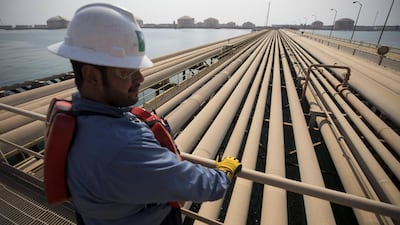Saudi Aramco, the world’s third-most valuable company and largest crude exporter, has closed a $12.4 billion deal with a consortium led by EIG Global Energy Partners for the acquisition of a 49 per cent stake in its oil pipeline business.
The deal is Aramco’s largest since its 2019 listing on the Tadawul exchange, when it raised more than $29bn.
It attracted a group of global investors from Asia, North America and the Middle East, including Abu Dhabi's sovereign fund Mubadala.
The new venture, Aramco Oil Pipelines Company, will lease rights to use the state oil company’s stabilised crude oil pipeline network, which connects oilfields to the downstream network, for 25 years.
“The interest we have received from investors shows strong confidence in our operations and the long-term outlook for our business,” said Aramco president and chief executive Amin Nasser.
“We plan to continue to explore opportunities to capitalise on our industry-leading capabilities and attract the right type of investment to Saudi Arabia.”
The agreement, which was first announced in April, allows Aramco to generate money from its pipeline assets while retaining overall ownership and operational control of the network. The transaction does not impose any restrictions on Aramco’s actual crude oil volumes, which are subject to production decisions made by the kingdom, Aramco said.
The consortium is comprised of institutional investors from China, Saudi Arabia, South Korea, the UAE and the US, EIG said in a statement on its website.
The venture will receive a tariff from Aramco for oil that flows through the network, backed by minimum volume commitments. Aramco will hold a 51 per cent stake in the venture while EIG will hold the remainder. The deal has a total equity value of about $25.3bn, according to EIG.
“The calibre of this marquee global infrastructure asset is further evidenced by the leading investors that have invested alongside EIG,” said EIG chairman and chief executive Robert Thomas.
HSBC Bank and Latham & Watkins were EIG’s financial and legal advisers, respectively.
Washington-based EIG is an institutional investor with interests in energy and energy-related infrastructure. It had $21.7bn under management as of March 31 this year.
Abdulaziz Al Gudaimi, Aramco’s senior vice president of corporate development, said the deal reinforces the company’s “resilience and ability to adapt in a rapidly changing business environment”.
“The interest we received for this deal is evidence of continued confidence in our company from institutional investors and sets a new benchmark for infrastructure transactions globally,” he said.
The investment by the consortium underscores the “compelling investment opportunity presented by Aramco’s globally significant pipeline assets, the company’s robust long-term outlook and the attractiveness of the kingdom of Saudi Arabia to institutional investors”, Aramco said.
The state oil company, which made a profit of 183.7bn Saudi riyals ($50bn) last year, announced last week that it plans to tap into debt capital markets through the issue of dollar-denominated sukuk. It did not disclose how much it intends to raise but said the money would be used “for general corporate purposes or for any other purpose specified” in the offer documents for the sukuk.
Aramco’s move to generate revenue from its pipeline network comes after similar initiatives taken by Adnoc.
The Abu Dhabi company completed a $20.7bn deal with a consortium of infrastructure and sovereign funds to buy a stake in its natural gas pipelines in July last year.
This agreement came after a $5bn investment in the company’s oil pipelines by other investors in 2019.


